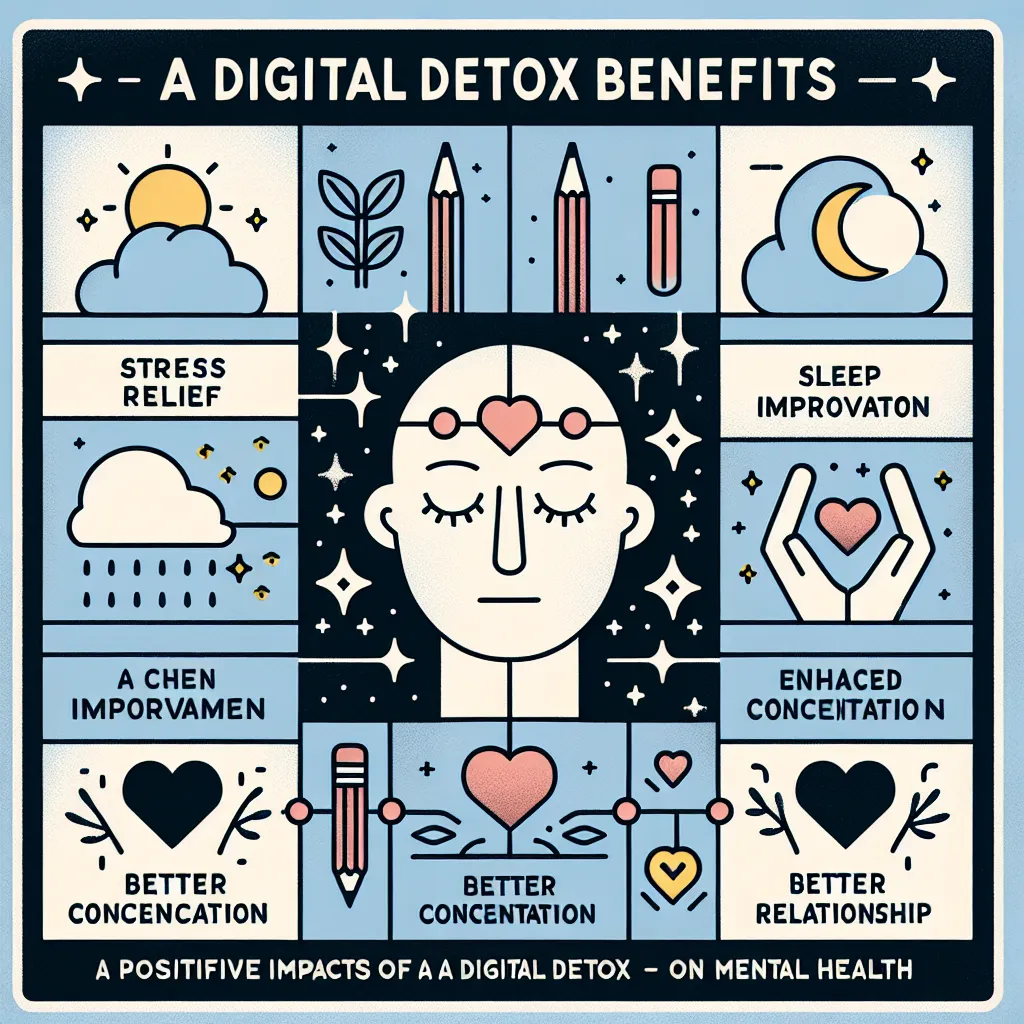In recent years, the topic of digital detox and its impact on mental well-being has gained significant traction in IELTS Writing Task 2 essays. This subject has appeared in various forms across multiple test versions, reflecting its relevance in our increasingly digital world. As we look ahead, it’s highly likely that questions related to digital detox and mental health will continue to feature prominently in future IELTS exams. Let’s explore this theme through a sample question and provide model essays to help you prepare effectively.
Analyzing the Topic
Before we dive into the sample essays, it’s crucial to understand the concept of digital detox and its relationship with mental well-being. Digital detox refers to the practice of abstaining from electronic devices and digital media for a period of time. This practice is believed to have numerous benefits for mental health, including reduced stress, improved sleep quality, enhanced focus, and better interpersonal relationships.
 Digital Detox Benefits Infographic
Digital Detox Benefits Infographic
Sample IELTS Writing Task 2 Question
Let’s consider the following question, which is representative of how this topic might appear in an IELTS Writing Task 2 prompt:
In today’s digital age, many people are experiencing increased stress and anxiety due to constant connectivity. Some suggest that regular ‘digital detox’ periods can significantly improve mental well-being. To what extent do you agree or disagree with this statement?
Analyzing the Question
This question requires you to:
- Understand the concept of ‘digital detox’
- Consider the relationship between digital connectivity and mental health
- Evaluate the potential benefits of digital detox on mental well-being
- Present your opinion on the effectiveness of digital detox
- Support your arguments with relevant examples and explanations
Model Essay 1 (Band 8-9)
In the modern era, where smartphones and social media dominate our daily lives, the notion of a ‘digital detox’ has gained significant traction as a potential remedy for the mounting stress and anxiety associated with constant connectivity. I strongly agree that regular periods of digital detox can substantially enhance mental well-being, as they offer crucial opportunities for individuals to disconnect, recharge, and regain control over their digital consumption habits.
The pervasive nature of digital technology has undeniably transformed our lives, offering unprecedented access to information and communication. However, this constant connectivity has also led to a range of mental health challenges. Incessant notifications, the pressure to maintain an online presence, and the phenomenon of ‘FOMO’ (fear of missing out) contribute to heightened stress levels and anxiety. Moreover, excessive screen time has been linked to sleep disturbances, reduced attention spans, and decreased face-to-face social interactions, all of which can negatively impact mental health.
Implementing regular digital detox periods can serve as a powerful antidote to these issues. By consciously disconnecting from digital devices, individuals create space for activities that promote mental well-being. For instance, spending time in nature, engaging in physical exercise, or practicing mindfulness can all help reduce stress and anxiety. A study by the University of Maryland found that students who abstained from digital media for 24 hours reported feeling more present in their interactions and less dependent on technology for entertainment.
Furthermore, digital detoxes can foster improved sleep patterns and enhanced cognitive function. The blue light emitted by screens has been shown to disrupt circadian rhythms, making it difficult to fall asleep and achieve restful sleep. By avoiding screens before bedtime, individuals can experience better sleep quality, leading to improved mood and mental clarity. Additionally, periods away from digital distractions allow for deeper focus and creativity, as demonstrated by numerous anecdotes from writers, artists, and entrepreneurs who credit digital detoxes with boosting their productivity and innovative thinking.
However, it is important to acknowledge that complete abstinence from digital technology is neither practical nor desirable in many cases. The key lies in striking a balance and developing a healthier relationship with digital devices. This can be achieved through various strategies, such as designated tech-free hours, digital-free weekends, or simply being more mindful of one’s digital consumption habits.
In conclusion, while digital technology offers numerous benefits, the practice of regular digital detoxes presents a valuable opportunity to mitigate its negative impacts on mental health. By providing respite from the constant barrage of digital stimuli, these periods allow individuals to reconnect with themselves, their environment, and others in meaningful ways. As we continue to navigate an increasingly digital world, incorporating regular digital detoxes into our lives can serve as a crucial tool for maintaining and enhancing our mental well-being.
(Word count: 457)
Model Essay 2 (Band 6-7)
In today’s world, many people are always connected to their devices, which can cause stress and worry. Some people think that taking regular breaks from technology, called ‘digital detox’, can help improve mental health. I agree that digital detox can be good for our mental well-being, but I think it’s not the only solution.
First, it’s true that being online all the time can be bad for our mental health. We get many notifications and messages that can make us feel stressed. Also, seeing other people’s perfect lives on social media can make us feel bad about ourselves. When we do a digital detox, we can take a break from these problems. For example, we can spend time outside or talk to friends face-to-face, which can make us feel better.
Another good thing about digital detox is that it can help us sleep better. Phones and computers give off light that can make it hard to sleep. If we stop using these devices before bed, we might sleep better. Good sleep is important for our mental health because it helps us feel less stressed and more positive.
However, it’s important to remember that technology also has many benefits. It helps us stay connected with friends and family, learn new things, and do our work. So, I don’t think we should completely stop using technology. Instead, we should try to find a balance. We can set times when we don’t use our devices, like during meals or before bed. This way, we can still use technology but also give our minds a break.
In conclusion, I believe that digital detox can be helpful for our mental health, but it’s not the only answer. The key is to use technology in a way that doesn’t harm our well-being. By finding a balance between using devices and taking breaks, we can enjoy the benefits of technology while also taking care of our mental health.
(Word count: 320)
Key Writing Tips
-
Vocabulary: Use a range of topic-specific vocabulary related to digital detox and mental health. For higher band scores, incorporate more sophisticated terms and phrases.
-
Grammar: Demonstrate a variety of complex structures. For Band 8-9, use a mix of compound and complex sentences, while Band 6-7 can focus on using some complex structures accurately.
-
Coherence and Cohesion: Ensure your essay flows logically. Use appropriate linking words and phrases to connect ideas within and between paragraphs.
-
Task Response: Address all parts of the question and provide a clear position throughout the essay. Higher band scores require a more nuanced approach to the topic.
-
Examples: Include relevant examples to support your arguments. For higher scores, use specific studies or data where possible.
Essential Vocabulary
- Digital detox (noun) /ˌdɪdʒɪtl ˈdiːtɒks/ – A period during which a person refrains from using electronic devices
- Connectivity (noun) /ˌkɒnek’tɪvəti/ – The state of being connected or interconnected
- Mental well-being (noun phrase) /ˈmentl wel-ˈbiːɪŋ/ – A state of psychological and emotional health
- Anxiety (noun) /æŋˈzaɪəti/ – A feeling of worry, nervousness, or unease about something
- FOMO (acronym) /ˈfəʊməʊ/ – Fear of missing out; anxiety that an exciting event may be happening elsewhere
- Circadian rhythm (noun phrase) /sɜːˈkeɪdiən ˈrɪðəm/ – The natural, internal process that regulates the sleep-wake cycle
- Mindfulness (noun) /ˈmaɪndfʊlnəs/ – The practice of being aware of one’s thoughts, feelings, and surroundings in the present moment
- Cognitive function (noun phrase) /ˈkɒɡnətɪv ˈfʌŋkʃn/ – Mental processes including attention, memory, and problem-solving
- Screen time (noun phrase) /skriːn taɪm/ – Time spent using a device with a screen such as a smartphone, computer, or television
- Work-life balance (noun phrase) /wɜːk laɪf ˈbæləns/ – The division of one’s time and focus between working and family or leisure activities
Conclusion
The topic of digital detox and its impact on mental well-being is likely to remain relevant in future IELTS Writing Task 2 questions. To prepare effectively, practice writing essays on related themes such as:
- The impact of social media on mental health
- Technology addiction in young people
- The role of technology in work-life balance
- The effects of screen time on children’s development
Remember to structure your essays clearly, use a range of vocabulary and grammar structures, and support your arguments with relevant examples. By practicing regularly and incorporating feedback, you can improve your writing skills and achieve your target band score in the IELTS Writing Task 2.
We encourage you to practice writing an essay based on the question provided in this article. Share your essay in the comments section below for feedback and discussion with other learners. This active practice is an excellent way to refine your skills and prepare for the IELTS Writing Task 2.


